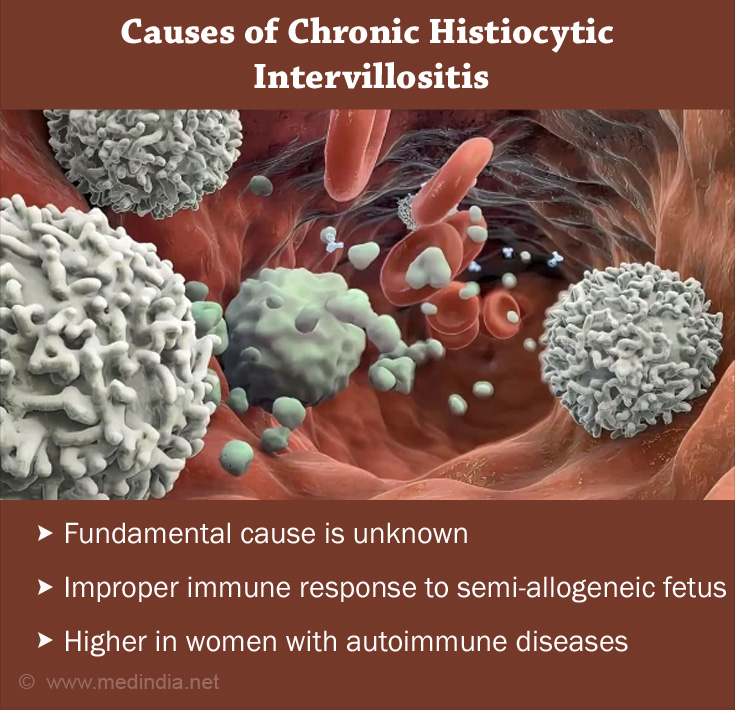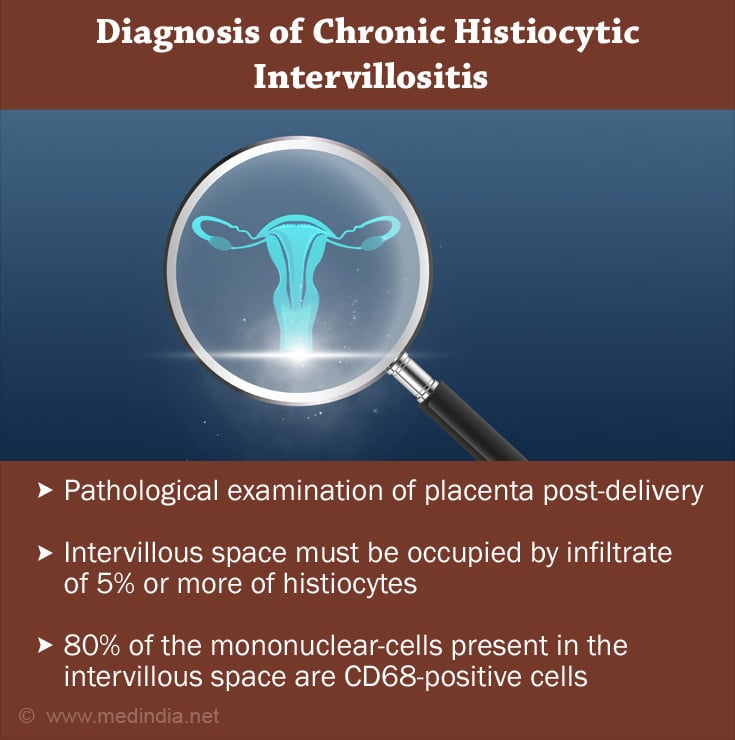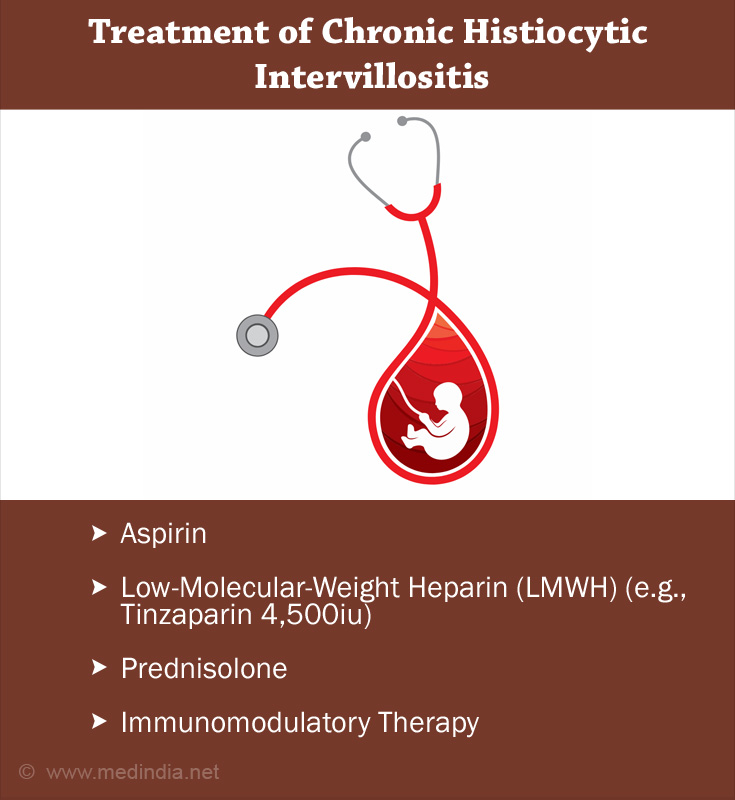- Chronic histiocytic intervillositis: A breakdown in immune tolerance comparable to allograft rejection? - (https://www.ncbi.nlm.nih.gov/pmc/articles/PMC7988544/)
- What is Chronic Histiocytic Intervillositis (CHI)? | CHI (Chronic Histiocytic Intervillositis) Support - (https://chisupport.org/)
- Case Report: Successful pregnancy following treatment of recurrent chronic histiocytic intervillositis - (https://pubmed.ncbi.nlm.nih.gov/28073874/)
- Chronic Histiocytic Intervillositis - A Leaflet for Mothers - (https://www.tommys.org/sites/default/files/legacy/CHI_Patient_Leaflet.pdf)
- Towards standardized criteria for diagnosing chronic intervillositis of unknown etiology: A systematic review - (https://www.sciencedirect.com/science/article/pii/S0143400417312055)
- The University of Manchester ResearchImmunomodulatory Therapy Reduces the Severity of Placental Lesions in Chronic Histiocytic Intervillositis - (https://www.research.manchester.ac.uk/portal/files/205163966/fmed_08_753220.pdf)
What is Chronic Histiocytic Intervillositis?
Chronic Histiocytic Intervillositis (CHI) is a pregnancy condition in which immune cells from the mother (called macrophages or histiocytes) build up in the placenta and create blood clots and prevents mother’s blood to flow into the fetus. Strong links exist between CHI and higher risk of stillbirth and fetal mal-development. Although uncommon, involving six in every 10,000 pregnancies however the recurrence rate is high at 25%–100%(1✔ ✔Trusted Source
Chronic histiocytic intervillositis: A breakdown in immune tolerance comparable to allograft rejection?
Go to source).
This condition is also called as Chronic (histiocytic) intervillositis of unknown etiology (CIUE), Massive Chronic Intervillositis (MCI), Nonspecific Chronic Macrophagic Intervillositis, Histiocytic Intervillositis (HI)(2✔ ✔Trusted Source
What is Chronic Histiocytic Intervillositis (CHI)? | CHI (Chronic Histiocytic Intervillositis) Support
Go to source).
History of Chronic Histiocytic Intervillositis?
CHI was first reported as a distinct clinical entity in 1987. In a clinical scenario, villitis of unknown cause and CHI appear to overlap in certain cases and precise diagnostic standards for CHI have not yet been established. CHI can only be identified after a pathological examination of the placenta, as non-specific peripheral blood tests like alkaline phosphatase are often elevated but are not just restricted to just this condition(3✔ ✔Trusted Source
Case Report: Successful pregnancy following treatment of recurrent chronic histiocytic intervillositis
Go to source).
What are the Causes of Chronic Histiocytic Intervillositis?
Although the fundamental cause is unknown, CHI is thought to be an improper immune response to the semi-allogeneic fetus. It might be due to the presence of maternal macrophages. The reported greater occurrence is in women with autoimmune disease(1✔ ✔Trusted Source
Chronic histiocytic intervillositis: A breakdown in immune tolerance comparable to allograft rejection?
Go to source)

What are the Symptoms and Signs of Chronic Histiocytic Intervillositis?
Unfortunately, women with CHI do not exhibit any symptoms, and the illness cannot be identified until after delivery when pathologists, who are medical specialists examine the placenta.
Some evidence suggests Alkaline Phosphatase, a placental enzyme, may be increased in cases of CHI, but that is not known for sure.
The accuracy of this test is also not known. If a woman was previously affected with CHI during pregnancy, the problem might recur during subsequent pregnancies and the reason for this happening still remains unclear(4✔ ✔Trusted Source
Chronic Histiocytic Intervillositis - A Leaflet for Mothers
Go to source).
Symptoms in pregnancies less than 12 weeks can be spontaneous miscarriage and high white blood cell, neutrophil and monocyte count. In pregnancies of 12+ weeks, restricted growth of fetus and reduced amniotic fluid can be seen(2✔ ✔Trusted Source
What is Chronic Histiocytic Intervillositis (CHI)? | CHI (Chronic Histiocytic Intervillositis) Support
Go to source).
How do you Diagnose Chronic Histiocytic Intervillositis?
CHI can only be diagnosed post-delivery or abortion upon examination of the placenta due to a lack of diagnostic biomarkers.
The diagnosis can be confirmed upon pathological examination of placenta. The key is the finding of the so called infiltrates of 'histiocytes' as the indicated by the name of the condition, in the intervillous space of the placenta. Around 80% of the these histiocytes or the mononuclear-cells present in the intervillous space are CD68-positive cells and the for establishing the diagnosis - intervillous space must be occupied by at least 5% or more of these infiltrates of histiocytes(5✔ ✔Trusted Source
Towards standardized criteria for diagnosing chronic intervillositis of unknown etiology: A systematic review
Go to source).

How can Chronic Histiocytic Intervillositis be Treated?
Pregnancies with CHI are managed using the following drugs -
- Aspirin
- Low-Molecular-Weight Heparin (LMWH) (e.g., Tinzaparin 4,500iu)
- Steroid such as Prednisolone
- Immunomodulatory Therapy have also shown to reduce the severity of placental lesions in CHI(6✔ ✔Trusted Source
The University of Manchester ResearchImmunomodulatory Therapy Reduces the Severity of Placental Lesions in Chronic Histiocytic Intervillositis
Go to source).











